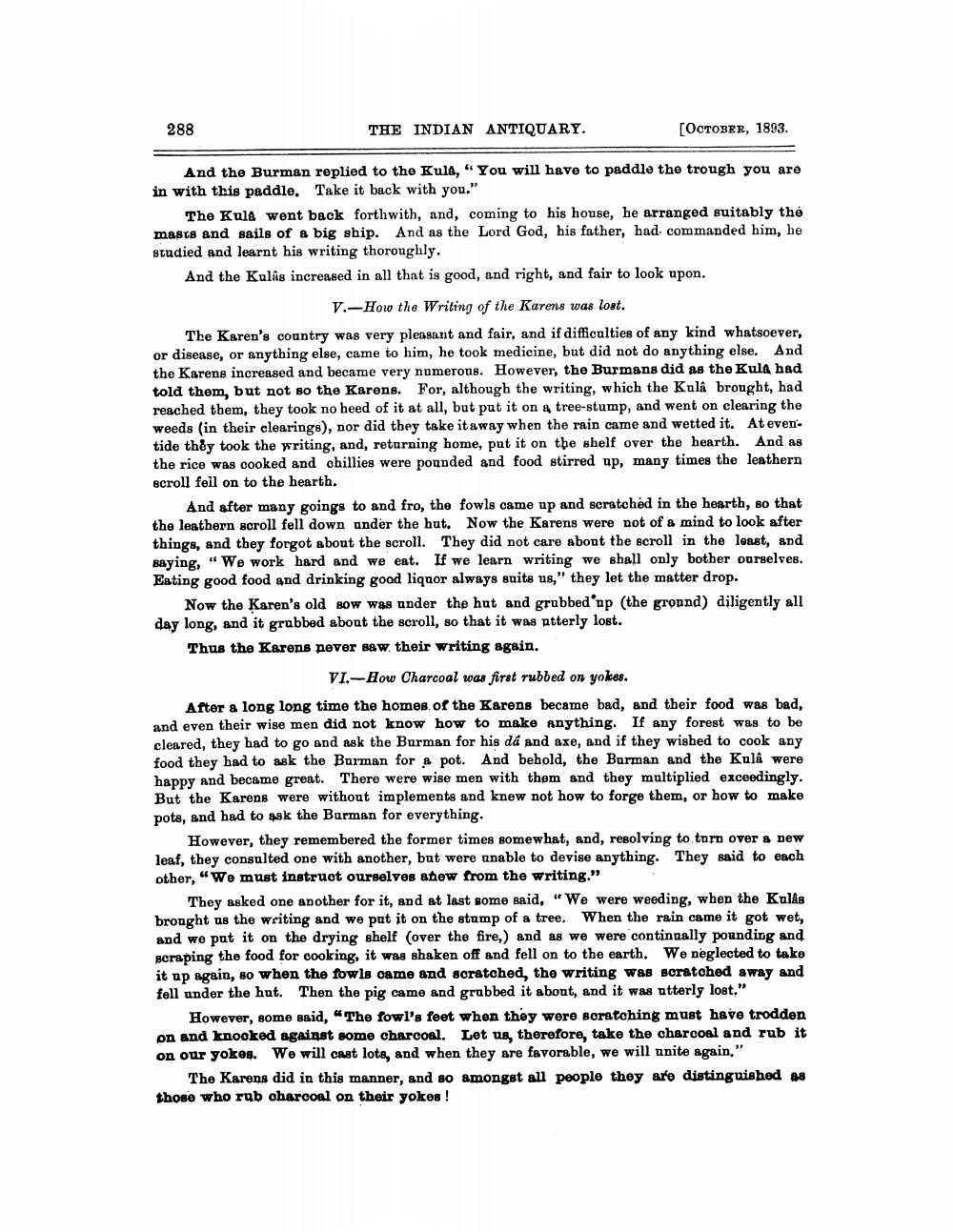________________
288
THE INDIAN ANTIQUARY.
[OCTOBER, 1893.
And the Burman replied to the Kula, " You will have to paddle the trough you are in with this paddle. Take it back with you."
The Kuld went back forthwith, and, coming to his house, he arranged suitably the masts and sails of a big ship. And as the Lord God, his father, had commanded him, he studied and learnt his writing thoroughly.
And the Kulâs increased in all that is good, and right, and fair to look upon.
V.-How the Writing of the Karens was lost. The Karen's country was very pleasant and fair, and if difficulties of any kind whatsoever, or disease, or anything else, came to him, he took medicine, but did not do anything else. And the Karens increased and became very numerous. However, the Burmans did as the Kuld had told them, but not so the Karens. For, although the writing, which the Kulâ brought, had reached them, they took no heed of it at all, but put it on a tree-stump, and went on clearing the weeds (in their clearings), nor did they take it away when the rain came and wetted it. At eventide they took the writing, and, returning home, put it on the shelf over the hearth. And as the rice was cooked and chillies were pounded and food stirred up, many times the leathern scroll feil on to the hearth.
And after many goings to and fro, the fowls came up and scratched in the hearth, so that the leathern scroll fell down under the hut. Now the Karens were not of a mind to look after things, and they forgot about the scroll. They did not care about the scroll in the least, and saying, “We work hard and we eat. If we learn writing we shall only bother ourselves. Eating good food and drinking good liquor always suits us,” they let the matter drop.
Now the Karen's old sow was under the hut and grubbed'ap (the ground) diligently all day long, and it grubbed about the scroll, so that it was utterly lost. Thus the Karens never saw their writing again.
VI.-How Charcoal was first rubbed on yokes. After a long long time the homes of the Karens became bad, and their food was bad, and even their wise men did not know how to make anything. If any forest was to be cleared, they had to go and ask the Burman for his dá and axe, and if they wished to cook any food they had to ask the Burman for a pot. And behold, the Burman and the Kulâ were happy and became great. There were wise men with them and they multiplied exceedingly. But the Karens were without implements and knew not how to forge them, or how to make pots, and had to ask the Burman for everything.
However, they remembered the former times somewhat, and, resolving to turn over a new leaf, they consulted one with another, but were unable to devise anything. They said to each other, “We must instruct ourselves anew from the writing."
They asked one another for it, and at last some said, “We were weeding, when the Kulás brought us the writing and we put it on the stump of a tree. When the rain came it got wet, and we put it on the drying shelf (over the fire,) and as we were continually pounding and scraping the food for cooking, it was shaken off and fell on to the earth. We neglected to take it up again, so when the fowls came and scratched, the writing was scratched away and fell under the hut. Then the pig came and grubbed it about, and it was utterly lost."
However, some said, "The fowl's feet when they were scratching must have trodden on and knooked against some charcoal. Let us, therefore, take the charcoal and rub it on our yokes. We will cast lote, and when they are favorable, we will unite again."
The Karens did in this manner, and so amongst all people they are distinguished as those who rub charcoal on their yokes!




